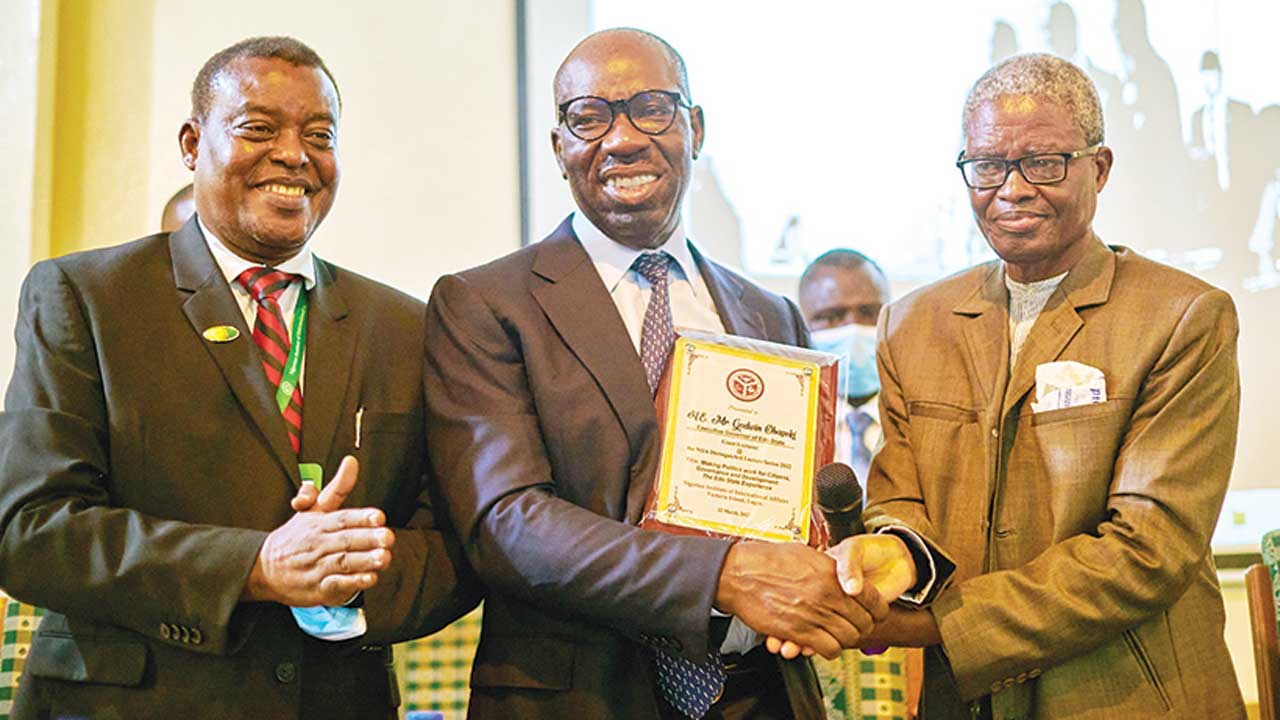
• Chides political elite for failing to engender devt
• Edo attracts $500m investment into agric sector
Edo State Governor, Mr. Godwin Obaseki, has said Nigeria can adopt the novel interventions and radical changes implemented in Edo State in tackling the myriad of challenges and stem the country’s current slide to economic and socio-political crisis.
The Special Assistant, Media to the Governor, Crusoe Osagie, quoted Obaseki as making the declaration while delivering the 2022 Nigeria Institute of International Affairs (NIIA) Distinguished Lecture Series titled, “Making Politics Work for Citizens, Governance and Development: The Edo State Experience,” at the Institute, in Victoria Island, Lagos.
He said: “We should also reflect on why we the political actors, particularly those of us who are the political elite, who have the responsibility not only to institutionalise the democratic process but also to develop a political culture, which should foster and enhance development, have so far failed to do so.”
The governor noted that although politics and democracy have not dealt favourably with Nigeria, this does not deny the existence of the potential for democracy to be the vehicle for the delivery of development to the people.
The governor said some of his achievements include attracting $500m into the state’s agriculture sector; creation of 300,000 jobs; the 95MW Ossiomo power project; improved basic education for over 400,000 pupils, and the 6000bpd-capacity Edo modular refinery, among others.
“In Edo, we had to take deliberate and intentional steps to retool our politics to engender development. This has led to the introduction of people-centric policies and programmes, which have won our administration significant public trust,” he said.
Decrying the failure of the political class, Obaseki added, “As we commence another political transition in our democratic journey, we must reflect on the challenges faced in this Republic, so that we can better understand why our democratic experience to date has not provided good governance and why our economic and socio-political development have remained stunted.”
Some of the defects of Nigeria’s political system, according to him, include entry barriers to the political system such as age restriction and high cost of nomination and expression of interest; negative perception of politics and the attendant skirmishes, including mudslinging, deliberate character assassination and blackmail, which make it unattractive to accomplished professionals to participate in; prohibitive cost of the electioneering process; proliferation of political parties with no clear ideology, and electoral malpractices which have instigated voter apathy.
On the elections, he said if what happened in Edo could be replicated in the forthcoming Presidential and National Assembly elections, Nigeria would have taken a critical step to democratic consolidation.”
The Director General of NIIA, Prof. Eghosa Osaghae, said the lecture is rich because the governor is stewed in the classical tradition with his background in classics, which is demonstrated with the achievements recorded in the state since his foray into politics.
Earlier, the Chairman of the occasion, Prof. Bola Akinteriwa, said the lecture was a reminder that foreign policy is an extension of domestic policy, noting: “We do not have a good international image because of the way we govern ourselves. People often believe that anything goes in Nigeria. But today, we have someone who is doing things well. Whoever wants a constructive solution must learn from the experience of others. It is going to be empirical and a case study.”



